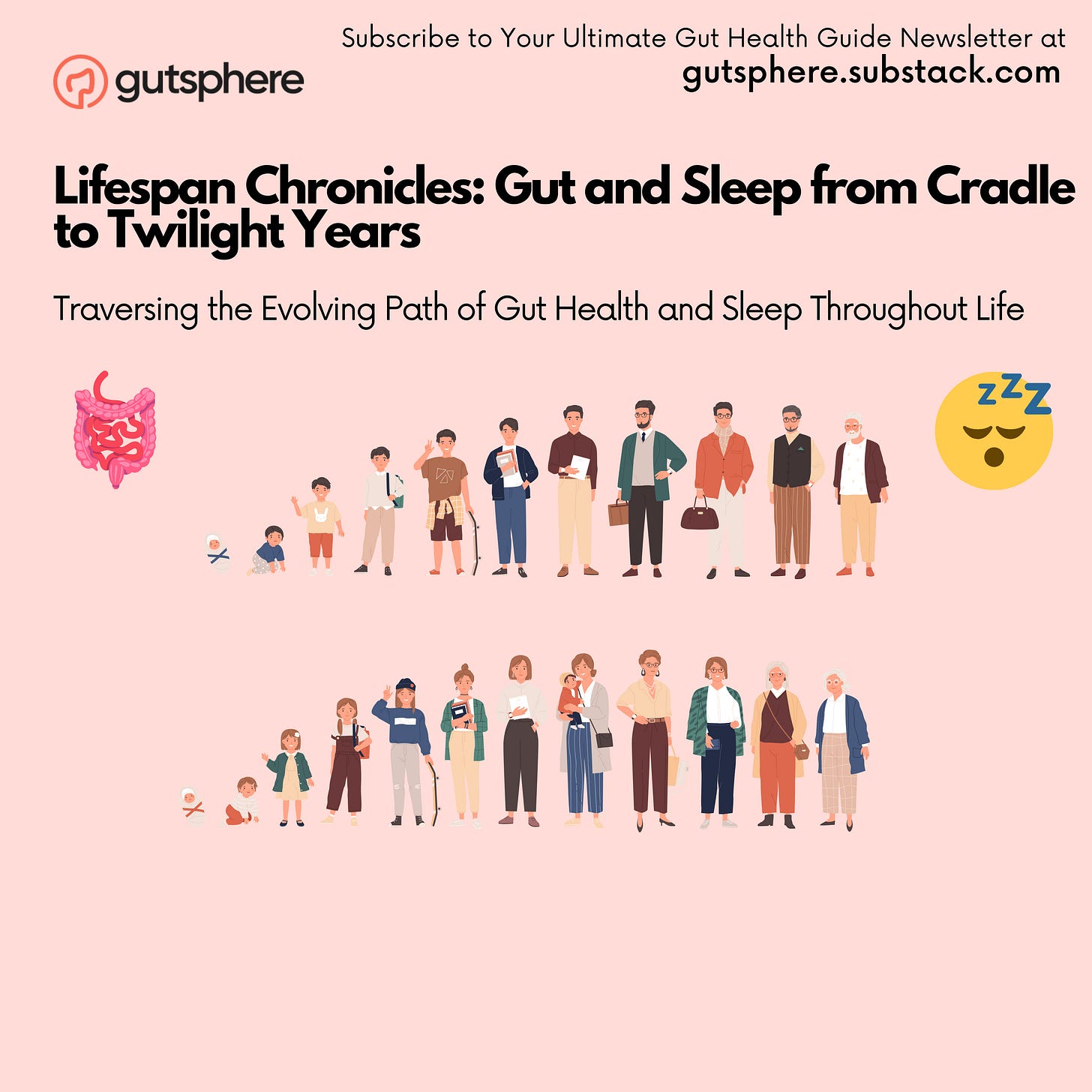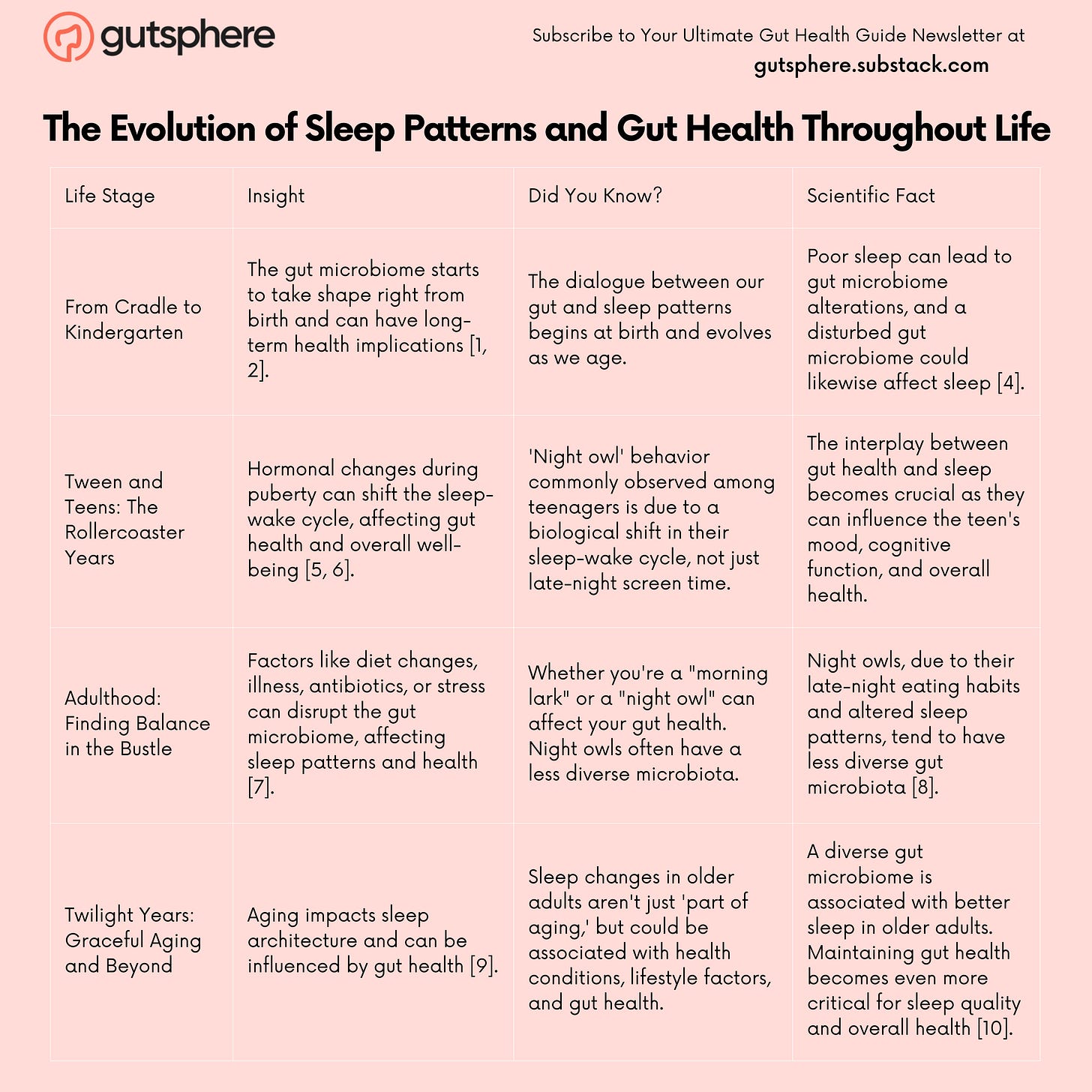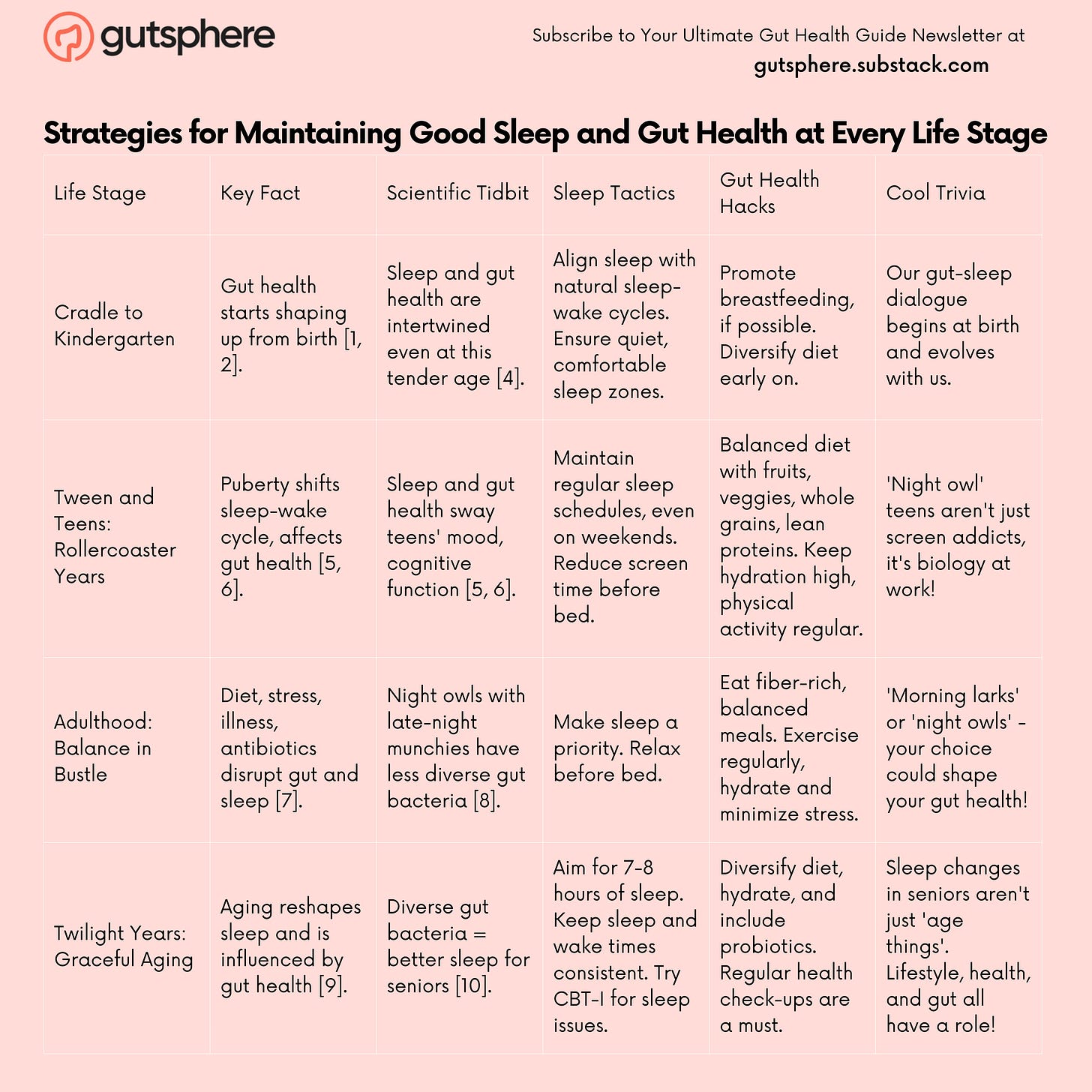The Lifelong Journey: Gut Health and Sleep From Birth to Old Age
The Evolution of Sleep Patterns and Gut Health Throughout Life
Hello GutSphere community!
Welcome to Part 7 of our captivating series - Lifespan Chronicles: Gut and Sleep from Cradle to Twilight Years! We have been on a marathon to synthesize the latest scientific findings and present them to you in an engaging, accessible, and digestible way.
Our gut microbiome and sleep are two fundamental factors that shape our health and well-being. From the moment we are born to the twilight years, these two elements dance together in a symbiotic ballet, choreographed by our lifestyle, environment, and genetic factors. In this edition, we delve into their dynamic evolution throughout life - a journey that can be as beautiful and complex as life itself.
We titled this part 'The Lifelong Journey: Gut Health and Sleep From Birth to Old Age' to underscore the constant interplay between gut health and sleep at each stage of life. They adapt, mature, and transform in response to our growth, lifestyle, stressors, and aging - a process as fascinating as it is impactful on our health and well-being.
What does the gut microbiome of a newborn look like? How does it evolve during adolescence? How does sleep change from infancy to adulthood, and how does it affect and get affected by our gut health? We answer these intriguing questions as we traverse the evolving path of gut health and sleep throughout life.
But this journey doesn't end at understanding the changes - it's also about empowerment. Hence, we also focus on strategies for maintaining good sleep and gut health at each stage. From childhood through adolescence, adulthood, and into the golden years, we present practical, scientifically-backed strategies to cultivate a healthy gut and sound sleep.
In the next sections, we'll navigate through the stages of life, unraveling the story of our gut and sleep. Get ready to embrace the symbiotic dance between these two pillars of health and wellness - a dance that lasts a lifetime. So sit back, relax, and let's begin this enlightening journey of discovery!
So without further ado, let's dive into the intricacies of the gut-sleep axis from the cradle to the twilight years!
The Lifelong Journey: Gut Health and Sleep From Birth to Old Age
Did you know? The dialogue between our gut and your sleep patterns begins the moment we enter this world and continues throughout our life, evolving as we age.
From Cradle to Kindergarten:
Right from birth, the gut microbiome starts to take shape, influenced by factors such as birth mode (vaginal birth or C-section) and feeding method (breast milk or formula) [1]. This early microbiota composition can have long-term implications on health, influencing immunity, metabolism, and even brain development [2].
Sleep patterns in early childhood are equally essential. Newborns sleep almost 16-20 hours a day, distributed throughout day and night. This gradually matures into a consolidated sleep pattern more similar to adults by the age of 2 to 3 years [3].
Research suggests that there's a bidirectional relationship between sleep and gut health even at this early stage. Poor sleep can lead to gut microbiome alterations, and a disturbed gut microbiome could likewise affect sleep [4].
Tween and Teens: The Rollercoaster Years:
Puberty marks a significant transition in a child's life, accompanied by notable changes in sleep and gut health. Hormonal changes shift the sleep-wake cycle, often resulting in delayed sleep phase syndrome (DSPS). This is the 'night owl' behavior commonly observed among teenagers, causing them to stay up late and struggle to wake up in the morning [5].
Did you know? This isn't just due to late-night screen time, but a biological shift in their sleep-wake cycle.
The gut microbiome also continues to evolve during this phase. Changes in diet, stress levels, and even the onset of menstruation in girls could reshape the gut microbiota [6]. The interplay between gut health and sleep becomes increasingly crucial as they mutually impact each other and can influence the teen's mood, cognitive function, and overall health.
Adulthood: Finding Balance in the Bustle:
In adulthood, the gut microbiome generally stabilizes, unless disrupted by factors like diet changes, illness, antibiotics, or stress. Poor dietary habits, sedentary lifestyle, and chronic stress common in adult life can disturb the gut microbiome and influence sleep patterns, impacting health and well-being [7].
Did you know? Whether you're a "morning lark" or a "night owl" can affect our gut health. Night owls often have a less diverse microbiota, potentially leading to health issues
A fascinating aspect of sleep in adulthood is the existence of 'chronotypes.' Are you a morning lark that thrives in the early hours, or are you a night owl that hits their stride when the sun goes down? This preference is genetically influenced and can affect not just your productivity but also your gut health. Night owls tend to have a less diverse microbiota, potentially leading to health issues [8].
Twilight Years: Graceful Aging and Beyond:
As we age, sleep architecture changes. Older adults may experience decreased sleep efficiency, frequent nighttime awakenings, and a reduction in REM sleep. Contrary to common belief, these changes aren't just 'part of aging,' but could be associated with health conditions, lifestyle factors, and even gut health [9].
Research suggests that a diverse gut microbiome is associated with better sleep in older adults. As the gut microbiome changes with age, maintaining gut health becomes even more critical for sleep quality and overall health [10].
This mesmerizing journey of sleep and gut health continues throughout our lives, illustrating a beautiful dance of mutual influence. As the curtains draw to a close on this chapter, let's remember that the health of one can impact the other, emphasizing the importance of nourishing our gut and maintaining good sleep hygiene at every life stage.
References:
[1] Yatsunenko, T. et al. (2012). Human gut microbiome viewed across age and geography. Nature, 486(7402), 222-227.
[2] Subramanian, S. et al. (2014). Persistent gut microbiota immaturity in malnourished Bangladeshi children. Nature, 510(7505), 417-421.
[3] Paruthiyil, S. et al. (2001). Human Gut Microbiota and Healthy Aging: Recent Developments and Future Prospective. Nutrition and Healthy Aging, 4(4), 267-285. https://www.ncbi.nlm.nih.gov/pmc/articles/PMC5166512/
[4] Czeisler, C. A. (2011). Impact of sleepiness and sleep deficiency on public health—Utility of biomarkers. Journal of Clinical Sleep Medicine, 7(5), 6-8.
[5] Crowley, S. J., Acebo, C., & Carskadon, M. A. (2007). Sleep, circadian rhythms, and delayed phase in adolescence. Sleep medicine, 8(6), 602-612.
[6] Guénard, F. et al. (2013). Differential methylation in glucoregulatory genes of offspring born before vs. after maternal gastrointestinal bypass surgery. Proceedings of the National Academy of Sciences, 110(28), 11439-11444.
[7] Thaiss, C. A. et al. (2014). Transkingdom control of microbiota diurnal oscillations promotes metabolic homeostasis. Cell, 159(3), 514-529.
[8] Jones, S. E. et al. (2016). Genome-Wide Association Analyses in 128,266 Individuals Identifies New Morningness and Sleep Duration Loci. PLoS Genetics, 12(8), e1006125.
[9]Crosstalk between the Gut and Brain in Ischemic Stroke: Mechanistic Insights and Therapeutic Options, .
[10] Anderson, J. R. et al. (2017). A Preliminary Examination of Gut Microbiota, Sleep, and Cognitive Flexibility in Healthy Older Adults. Sleep Medicine, 38, 104-107.
Strategies for Maintaining Good Sleep and Gut Health at Each Stage
Embarking on this exciting journey, we must arm ourselves with the best tools and strategies to maintain and enhance the dialogue between our sleep and gut health. A beautiful symphony of microbial activity in our gut and the restful slumber that replenishes our body and mind every night are what we aim to tune and refine at each stage of our life journey.
The First Steps: From Cradle to Kindergarten
Ah, the tender age of infancy and early childhood! It's the period where the foundations of our sleep and gut health are being laid. As guardians of these future dreamers and achievers, our primary weapon in promoting good gut health is breastfeeding, which provides essential prebiotics and probiotics. This helps establish a healthy gut microbiome and sets the stage for optimal immune responses and mental health [1].
"Sleep like a baby" isn't just a fancy saying; it's a strategy. Newborns and infants need around 16-20 hours of sleep spread throughout the day. Ensuring our little ones get their sleep quota is crucial for their gut health, brain development, and overall growth [2].
Did you know? Warm baths and gentle massages can work wonders in promoting sleep in babies and regulating their sleep cycles.
Rollercoaster Years: Tween and Teens
Ah, puberty! A wild ride full of rapid changes and adjustments. For our adolescents, healthy eating habits are paramount. Including diverse fruits, vegetables, lean proteins, and whole grains in our diet helps maintain a rich and diverse gut microbiome [3]. Probiotic-rich foods like yogurt and fermented foods can be helpful additions to our teens' diets.
Sleep-wise, we need to respect our body's biological clock. Yes, we're looking at us, night owls! Keeping a consistent sleep schedule, even on weekends, is essential to prevent disruption to our sleep-wake cycle [4].
Common myth busted: The 'night owl' tendency in teenagers isn't due to rebellion; it's a biological shift in the sleep-wake cycle. Remember, understanding leads to empathy!
Adulthood: Finding Balance in the Hustle and Bustle
Adulthood brings its share of challenges, doesn't it? Long work hours, stress, and irregular eating habits can wreak havoc on both our gut and sleep health. The strategy here lies in balance and consistency.
A diet rich in fiber from fruits, vegetables, and whole grains, along with regular intake of probiotics (found in foods like yogurt and kefir), helps maintain a healthy gut microbiome [5]. Regular physical activity can also support a healthy gut and promote better sleep.
Speaking of sleep, it's not just the quantity, but the quality that counts. Establishing a relaxing pre-sleep routine, limiting exposure to screens before bed, and maintaining a sleep-conducive environment in the bedroom (think dark, cool, and quiet) can significantly improve our sleep quality [6].
Fun fact alert: Even our chronotype, whether we're a "morning lark" or a "night owl," can influence our gut health!
Twilight Years: Graceful Aging and Beyond
As we grow older, maintaining good sleep and gut health becomes even more critical. A diverse diet, high in fiber and rich in probiotics, supports gut health and promotes better sleep [7]. In addition, staying hydrated is vital, as water aids digestion and prevents constipation.
When it comes to sleep, we should listen to our bodies. Taking short naps, maintaining a regular sleep schedule, and ensuring our sleep environment is comfortable can all contribute to better sleep [8].
Did you know? Taking a walk outside every morning can help regulate our sleep-wake cycle, thanks to the natural light. It's never too late to enjoy the sun!
In conclusion, our journey towards maintaining good sleep and gut health at each stage of our lives is filled with understanding, empathy, balance, and some good old discipline. Remember, the journey is just as important as the destination, so let's ensure we enjoy every step, stride, and occasionally, stumble along the way!
References:
[1] O'Mahony, S. M., Clarke, G., Borre, Y. E., Dinan, T. G., & Cryan, J. F. (2015). Serotonin, tryptophan metabolism and the brain-gut-microbiome axis. Behavioural Brain Research, 277, 32-48.
[2] Hong, S., Zheng, G., & Wiley, J. W. (2019). Epigenetic Regulation of Genes that Modulate Chronic Stress-induced Visceral Pain in the Peripheral Nervous System. Gastroenterology, 156(1), 148-157.e8.
[3] Gubert, C., Kong, G., Renoir, T., & Hannan, A. J. (2020). Exercise, diet and stress as modulators of gut microbiota: Implications for neurodegenerative diseases. Neurobiology of Disease, 134, 104621.
[4] Benedict, C., Vogel, H., Jonas, W., Woting, A., Blaut, M., Schürmann, A., & Cedernaes, J. (2016). Gut microbiota and glucometabolic alterations in response to recurrent partial sleep deprivation in normal-weight young individuals. Molecular Metabolism, 5(12), 1175-1186.
[5] Messaoudi, M., Lalonde, R., Violle, N., Javelot, H., Desor, D., Nejdi, A., Bisson, J. F., Rougeot, C., Pichelin, M., Cazaubiel, M., & Cazaubiel, J. M. (2011). Assessment of psychotropic-like properties of a probiotic formulation (Lactobacillus helveticus R0052 and Bifidobacterium longum R0175) in rats and human subjects. The British Journal of Nutrition, 105(5), 755-764.
[6] Thompson, R. S., Roller, R., Mika, A., Greenwood, B. N., Knight, R., Chichlowski, M., Berg, B. M., & Fleshner, M. (2017). Dietary Prebiotics and Bioactive Milk Fractions Improve NREM Sleep, Enhance REM Sleep Rebound and Attenuate the Stress-Induced Decrease in Diurnal Temperature and Gut Microbial Alpha Diversity. Frontiers in Behavioral Neuroscience, 10, 240.
[7] Barrett, E., Ross, R. P., O'Toole, P. W., Fitzgerald, G. F., & Stanton, C. (2012). γ-Aminobutyric acid production by culturable bacteria from the human intestine. Journal of Applied Microbiology, 113(2), 411-417.
[8] Benedict, C., Vogel, H., Jonas, W., Woting, A., Blaut, M., Schürmann, A., & Cedernaes, J. (2016). Gut microbiota and glucometabolic alterations in response to recurrent partial sleep deprivation in normal-weight young individuals. Molecular Metabolism, 5(12), 1175-1186.
Part 7 Conclusion:
And there you have it! A fascinating journey through the various life stages, exploring the intricate dance between our gut health and sleep. From the cradle to our twilight years, we've seen how our gut microbiome and sleep patterns shape and are shaped by each other, influencing our overall wellbeing. We've also discovered practical strategies at each stage to keep this partnership harmonious. Remember, our bodies are complex ecosystems, and even a slight imbalance can create ripples of changes. It's about finding that sweet spot of balance, that 'Goldilocks zone,' where everything works just right.
Next Part 8:Harmonious Symphony: Tuning Our Gut Health with Our Body Clock
But the dance doesn't stop there. In the next part of our journey, we're about to step into a fascinating world where our internal body clock, also known as our circadian rhythms, enters the picture. Have you ever wondered why you feel a burst of energy at certain times of the day and feel sluggish at others? Or why your gut seems more agreeable to food at specific hours? As the maestro of our bodies, the circadian rhythm orchestrates our bodily functions, including sleep and gut health, to a rhythm as old as life itself.
In Part 8, we'll delve into the magical symphony of our body clock and gut health. We'll learn how to fine-tune our gut health with our circadian rhythms for optimal wellbeing. So, hold on to your seats; it's going to be an exhilarating ride!
Request
Share
Our sincere request to you is to share the newsletter with your friends, family, and community so that they can benefit from the content. Also it will help us grow the newsletter, and eventually, as we release more content, digital tools, and more we will enable people around the world to live chronic disease free.
Subscribe
Feedback
Also, please give us feedback so that we can improve the content. And if there are any topics that you want us to cover please send us your questions and topics. Furthermore, if you try any of the things we provided information please share your experience with us.
Thank You
GutSphere Team
Disclaimer
Please note that the information provided in this newsletter is for informational purposes only and should not be considered as a substitute for professional medical advice, diagnosis, or treatment. If you have any concerns or questions about our health, please consult with a licensed healthcare professional. The information contained in this newsletter is not intended to diagnose, treat, cure, or prevent any disease. The publisher and authors of this newsletter assume no responsibility for any adverse effects that may result from the use of the information contained herein.




